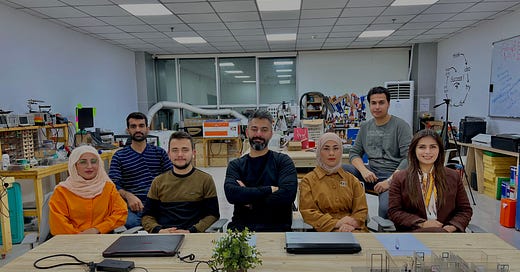Making Machines Work
The Erbil Makers Hub offers a rare opportunity for aspiring engineers to hone their skills and develop prototypes for a new generation of machines.
As a child, Mohammed Alsada used to break his toys on purpose. “I was really interested in electronics and manufacturing—I always wanted to know how they were made,” he says. These days, he still spends his time coding, 3D designing, and tinkering with electronics, but now he has state-of-the-art machines and years of expertise to work with. His mission is to pass these skills to a new generation of makers in Kurdistan and enable people to convert their ideas into reality. “Everything is getting digitized and automated, so these skills are really important,” Alsada, 32, says.
Across Iraq, automation and mechatronics engineers are in short supply, forcing private-sector employers to import labor from other countries. Part of the problem is the education system, says Alsada, explaining that students often lack access to the proper training equipment. “These machines are expensive and hard to maintain, so students just learn about them without actually understanding how they work,” he says. This is the gap he aims to fill through the Erbil Makers Hub initiative, which provides technical training and practical experience on a range of high-tech machines in its Makerspace.
“Machines are always problematic and need people to maintain them. There is a huge need for such people here. Yes, we need entrepreneurship, but we also need a solution for this problem,” Alsada says.
Inside the Makerspace, students practice with different machines, getting a feel for the technology and its capacity to realize their ambitions. Laser cutters, a 3D scanner, CNC machines, fully equipped electronics benches, and multiple 3D printers work with different materials to create items ranging from affordable prosthetic limbs and waste reduction machines to home accessories, educational toys, and various product prototypes.
A new 3D printer, purchased with the proceeds of an Innovation Hub grant from Ideas Beyond Borders, is the latest addition to the space and will allow users to work with multiple materials at a much faster pace while filtering out the noxious gases often created during the 3D printing process. “Having access to this equipment unleashes their creativity,” says Alsada, describing the students and entrepreneurs who frequent the space. “They are makers with ideas to implement but lack the purchasing power for this kind of equipment, so it’s a big deal to have it for them here.”
Alsada joined the space back in 2021 while working with an international NGO. When the NGO ended its operation in Iraq in 2022, he decided to keep the Makerspace active and took on the cost and management himself. “I was determined to maintain the vibrant community we had built,” he says.
It’s time-consuming work. Most days, Alsada is there from 9 am until 9:30 pm, only leaving when the building closes at night. Alongside the workshops, there’s the equipment to maintain, often with parts that can only be purchased from abroad. Costs climb quickly, but Alsada always finds a way to keep the doors open, building towards his future vision for the space. “I want this to be a big hub that connects creative minds—a place where anyone with an idea or special project can meet like-minded people, develop their skills, and support others in turn.”
Key to this plan is keeping access to the Makerspace affordable, so he runs digital manufacturing boot camps largely for free, meaning more people can benefit. Several of these initiatives, including the recent Product to Market Bootcamp program, were funded by the German Corporation for International Cooperation GmBH (GIZ), marking a positive step in ensuring the makerspace's continuity and growth.
Rawan Rashad, who recently graduated from the Makerspace Product-to-Market BootCamp, which was implemented in collaboration with The Station, has created a motorized blind stick that alerts the user to potential obstacles. “The blind stick was actually fully designed, customized, and produced in the Makerspace and has features that I haven’t seen anywhere else that could make a real difference to blind people,” Alsada says.
Some Makerspace projects have won awards, including Mohammed Hashim Ibrahim’s waste management machine "Green Coupon," which sorts plastic bottles and aluminum cans and then issues coupons that offer discounts in supermarkets to incentivize recycling. Another startup creates low-cost toys for children to keep them off smartphones and provide them with more educational forms of learning.
Part of his work also includes helping to link employers with skilled graduates. Two of his former students have recently been promoted from engineers to supervisors, contributing to the growth of a specialized local labor force that benefits the private sector and creates opportunities for new graduates entering the market. “We have the people we need here; they just need to practice on the right equipment and build trust in themselves,” says Alsada. “When they join, they are beginners, but by the end of the course, they have a new set of skills,” he adds.
This article was written by Olivia Cuthbert.





